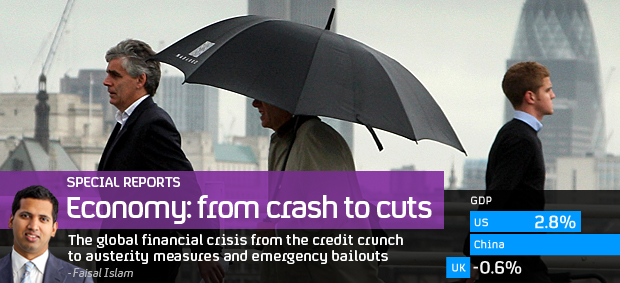Euro crisis could mean UK recession, says Osborne
Chancellor George Osborne warns Britain will “find it difficult to avoid a recession” if growth in Europe grinds to a halt, while France’s central banker says Europe faces “a true financial crisis”.
His prediction follows a stark warning from European Commissioner Olli Rehn that there are just 10 days left to save the euro.
The gloomy growth and borrowing figures in Mr Osborne’s autumn statement on Tuesday would have to be revised further downwards if the debt crisis in the eurozone worsens or the single currency collapses.
The Office for Budget Responsibility (OBR), which produced the figures, is not forecasting a recession in Britain, but the chancellor told BBC Breakfast this could happen.

He said: “If the eurozone goes into recession, into a deep recession, then I’m afraid Britain will find it difficult to avoid a recession itself, because people watching this programme will be going to work in companies that make things that they would normally sell to Germany, France, Italy and the like.
If the eurozone goes into recession… Britain will find it difficult to avoid a recession itself. Chancellor George Osborne
“That’s where Britain makes a lot of its money, so we are very affected by what happens in the eurozone.”
On Tuesday, eurozone ministers agreed to enlarge the 440bn euro European Financial Stability Facility (EFSF), the bailout fund that has already been used to rescue Ireland, Portugal and Greece.
But they were unable to reach a conclusion on how much more money is needed, and this uncertainty led to another rise in Spain and Italy’s borrowing costs on Wesnesday.
‘Critical period’
Mr Rehn, European economic and monetary affairs commissioner, said: “We are now entering the critical period of 10 days to complete and conclude the crisis response of the European Union.”
We are now looking at a true financial crisis – a broad-based disruption in financial markets. Christian Noyer, Bank of France governor
Christian Noyer, France’s central bank governor and a governing council member of the European Central Bank, said: “We are now looking at a true financial crisis – that is, a broad-based disruption in financial markets.”
China and other countries outside the eurozone are reluctant to commit money to bailing out indebted EU countries, and EFSF chief Klaus Regling said he did not expect other investors to come forward in the next few weeks. Nor was he able to say how big the EFSF was likely to become.
“It is really not possible to give one number for leveraging because it is a process. We will not give out 100bn next month. We will need money as we go along,” he said.
Autumn statement
In his autumn statement, Mr Osborne said tackling Britain’s deficit would take longer than expected because of weak economic growth.
The Office for Budget Responsibility downgraded its growth forecasts to 0.9 per cent in 2011 and 0.7 per cent in 2012. In March, it had predicted growth of 1.7 per cent in 2011 and 2.5 per cent in 2012. The goverment will need to borrow £112bn more than expected by 2015.
-
Latest news
-
Debate: how should the arts be funded as Israel funding boycotts grow?7m

-
Operation Black Vote: quarter of BAME adults not registered to vote in UK4m

-
Home Secretary demands explanation after Surrey Police ram cow with vehicle4m

-
Princess Kate makes first public appearance since cancer diagnosis2m

-
Labour rules out capital gains tax on sale of homes | Election ‘243m

-





